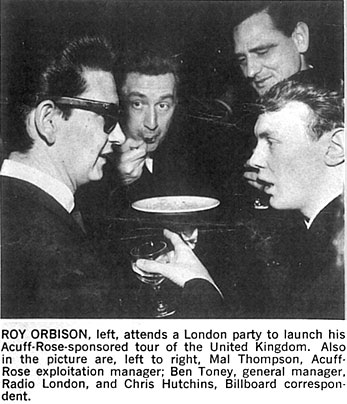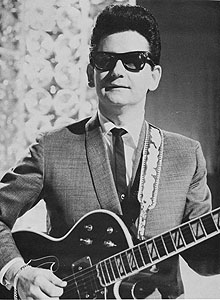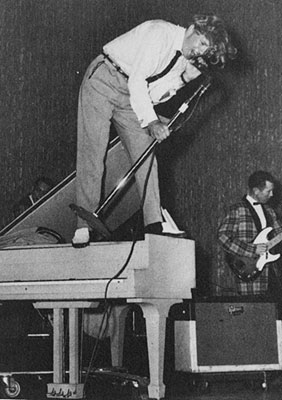The Amazing Radio London Adventure |
Big L Creates a Superstar
Before Radio London hit the air, the major record companies and the Performing Rights Society formed a pact and unofficially declared that they would not recognise the so-called 'pirates'. Their contention was that the pirates gave too much exposure to records and thus reduced their sales potential.
The Performing Rights Society is a group similar to ASCAP and BMI in America, representing composers, artists, and publishers, but the PRS was much more powerful than ASCAP and BMI. They had had a stranglehold on the BBC for years, allowing them to play a record only once a day, no matter how popular it might have been. If any one song was presented more than once a day, it had to be performed by a live orchestra or group.
As a promotional gimmick, the record companies bought-out the evening programming of Radio Luxembourg. EMI, the world's largest record company with several subsidiary companies, had 12 hours a week. Decca, the second largest company in the UK, had 8 hours per week. The rest of the time was divided up between Pye Records and the smaller labels. As a 'teaser', the record companies allowed the station to play about half of a single and then fade it out. This was presumably to make the listener want to go out and buy the record in order to hear the whole song.
Before the station went on the air, I had a representative from every record company calling on me. Each one would say, "Look, I'm not supposed to be here, but I will be sure you get all our new releases each week." The worst of them all was Fenella Ronald from EMI. She would check around all the corners before entering 17 Curzon Street. Then when she left, Fenella would then expect me to let her out of the basement door so that she wouldn't be spotted. This was both amusing and amazing to me.
All the major record companies except EMI invited us to their artist receptions on a regular basis. The first London reception I attended was for Roy Orbison and it was held at Terrazza Trattoria on Soho's Dean Street.
Some years before, two young Italians from Venice had arrived in London, worked very hard and finally opened a small restaurant which they called Terrazza Trattoria. Their food was authentic and very tasty, so when Frank Sinatra came to town, he tried their fare and liked it very much. Later, Frank wanted to throw a party, but his friends at the restaurant told him they didn't have enough space. Frank suggested that they kick a hole in the wall to the adjacent, vacant building to enlarge the restaurant and provide an area for parties and receptions. Frank put up the money for the 'facelift' and the new Terrazza Trattoria was born. It was the most popular Italian restaurant in London. This is where Roy Orbison and I first met.
 Roy and I had a lot in common. He was born in a small town in West Texas called Wink – about sixty miles south of my birthplace. We were both natives of the Llano
Roy and I had a lot in common. He was born in a small town in West Texas called Wink – about sixty miles south of my birthplace. We were both natives of the Llano  Estacado Staccato or 'Staked Plains' of Texas and New Mexico. Roy and I had attended North Texas State College (now the University of North Texas) at the same time, but neither of us remembered seeing the other at college. Roy and I did have two mutual friends in college, Dick Penner and Wade Moore. They wrote a ridiculously stupid song called 'Ooby Dooby' which launched Roy into his singing career. Of course, being the consummate singer that he was, Roy even made 'Ooby Dooby' sound good.
Estacado Staccato or 'Staked Plains' of Texas and New Mexico. Roy and I had attended North Texas State College (now the University of North Texas) at the same time, but neither of us remembered seeing the other at college. Roy and I did have two mutual friends in college, Dick Penner and Wade Moore. They wrote a ridiculously stupid song called 'Ooby Dooby' which launched Roy into his singing career. Of course, being the consummate singer that he was, Roy even made 'Ooby Dooby' sound good.
Roy grew up in the 'oil patch' near Odessa, Texas. His father worked there all his life, and when Roy went to college, he was following in his father's footsteps. He was a geology major with plans to return to the oil fields of West Texas. However, the world was so fortunate that Roy discovered his singing voice when he did. Otherwise, he might have spent the rest of his life serenading the oil derricks in the Permian Basin. Roy was one of the greatest singers I have ever known.
At the reception, Billboard Magazine took a picture of Roy, Mal Thompson of Acuff-Rose, their reporter Chris Hutchins and myself, which ran in the March 6, 1965 issue.
I went to Pye Records several times for various artist receptions – Pat Boone, Herb Alpert, Jackie Trent, and others. Pye's managing director, Louis Benjamin, was always there, and he and I became well acquainted.
One of the first song pluggers I met at the beginning of Radio London was Don Agness, whose office was in Denmark Street. Don was the exploitation manager for Leeds Music and he and I began having lunch weekly at the Bacco 70, a very nice Italian restaurant in Soho. The restaurant was owned by a young Venetian by the name of Ettore. Each time Don and I arrived, Ettore would greet us at the door with, "Mr Don, Mr Ben, welcome." This weekly meeting with Don and Ettore became the highlight of almost every week.
One of the first records we played on Radio London was 'Downtown' by Petula Clark – one of Don Agness's songs. Some of the records he pr omoted were not so great. He knew it and would tell me so, but he asked if I would throw one in now and then, if I could. However, if Don had a song that he believed in, he would hit me pretty hard to get it on the playlist.
omoted were not so great. He knew it and would tell me so, but he asked if I would throw one in now and then, if I could. However, if Don had a song that he believed in, he would hit me pretty hard to get it on the playlist.
One day, I walked into Don's office and he was beside himself. He said, "Ben, Ben, have I get a record for you!". I had a listen to the 'A' side and then the 'B' side and told him, "Don, I think I will go with the 'B'. I like it better". Don told me that Decca was going to promote the 'A' side and that it would be a big mistake to choose the 'B'. I finally agreed to go with the 'A' and it was probably one of the best choices I ever made. The record started with a bumpy-bump rhythm that was rather unusual for a song of that time, followed by the vibrant and clear voice of a young singer named Tom Jones. Although sounding unusual, it was called 'It's Not Unusual'.
I had not been at 17 Curzon Street very long when Philip Birch called me into his office. He said he had been approached by an American who wanted to be our publicity director and he asked me what I thought. I was feeling a bit alone at the time, since Don Pierson and the other Americans had cleared out and left me in the hands of the English. So I said that I thought it would be a good idea to hire the guy. This was when we welcomed aboard Mike Stone.
Mike had originally come to England as a record producer with his friend Shel Talmy. They discovered a group called the Kinks and produced their first big hit. Then they somehow-or-other got heavily into debt to Phil Solomon's artist agency and Phil ended up with the Kinks, leaving Mike out on the street. Mike and I ended up sharing an office in the basement at Curzon St. We also shared a secretary, whose job was to keep unwanted people away from me and to assist Mike in his PR work.
The day after Don had given me a copy of 'It's Not Unusual', Mike Stone suggested that he and I go down to Fleet Street and he'd introduce me to the trade papers. While we were there, we ran into Gordon Mills and his artist Tom Jones. Gordon introduced me to Tom, who said, "Hi". I said "Hi" back and that was the extent of our conversation. Gordon, not knowing that I had already agreed to play Tom's record, began plugging it and telling me that he would get me a copy. Since Decca had released only a few copies for promotion, he was quite surprised when I told him that I already had one.
 A day or two later, I met Gordon and Tom in New Bond Street. Gordon said that they were going to a nearby restaurant for a nosh, and invited me along. For the first three or so minutes Gordon and I chatted back and forth to each other while Tom just sat and listened. It seemed that he was a little shy, but after he got to know me better, he loosened up and joined in the conversation.
A day or two later, I met Gordon and Tom in New Bond Street. Gordon said that they were going to a nearby restaurant for a nosh, and invited me along. For the first three or so minutes Gordon and I chatted back and forth to each other while Tom just sat and listened. It seemed that he was a little shy, but after he got to know me better, he loosened up and joined in the conversation.
Gordon told me that he was having a small party for Tom at his flat the following night and suggested that I be his guest. I of course agreed. At the party, Tom and members of his group entertained.
Later, when both Tom and I were in a state of inebriated enthusiasm, Tom brought out a portable record player and he and I sat down in the middle of the living room floor playing Jerry Lee Lewis records. Tom was a big fan and possibly had every record Jerry Lee had ever recorded.
(Left, Tom Jones's hero Jerry Lee)
The success of Tom's record was still hanging in the balance, but not for long. As I remember it, we played the record for about a week before it entered the national charts to become a huge hit and the rest is history. Tom made a tape recording to be played on the Galaxy, giving Radio London credit for making 'It's Not Unusual' a hit. (Editor's note: according to Pete Brady, initially, the BBC had refused to play the record.)
In August 65, Tom was back in the Top Ten with 'With These Hands' and it was still in the Fab Forty when we made 'What's New Pussycat' the Radio London Club Disc of the Week. When that too became a chart-stormer, I realised that Radio London had launched its first superstar of the Sixties – the internationally-famous Tom Jones.
In the early Seventies, I was travelling through London and decided to drop by Leeds Music's new location in Piccadilly Street and visit my old friend Don Agness. Universal Pictures, Leeds' parent company, was on the ground floor, so when I discovered that Don's name was not in the office directory, I inquired at Universal about him. They didn't know him and advised me to check with Leeds upstairs, where I ran into Don's assistant, Alma Warren. She told me that Don had had some trouble with his heart. He had gone on vacation to his favourite resort, Rimini, Italy. Then after his return, his doctor decided that he should take some more time off. He and his wife were packing to go to Scotland when Don fell dead with a heart attack.